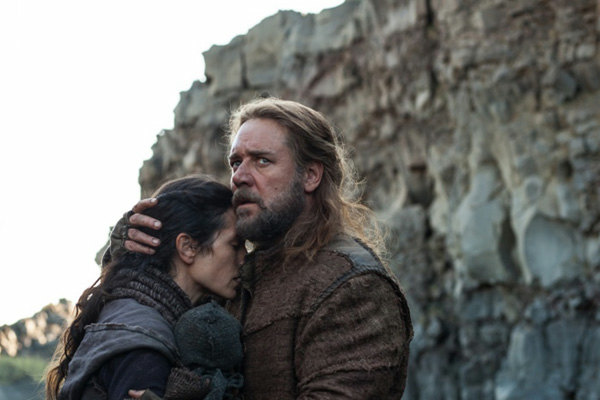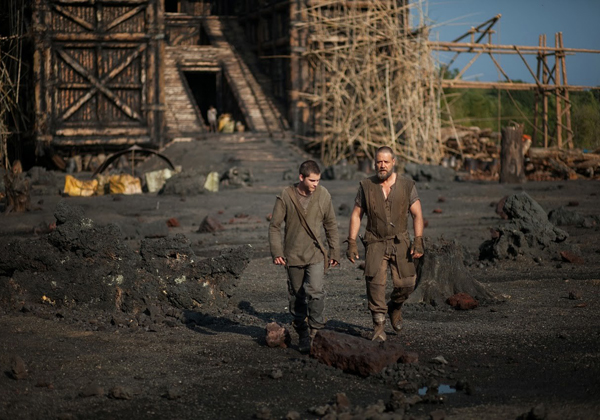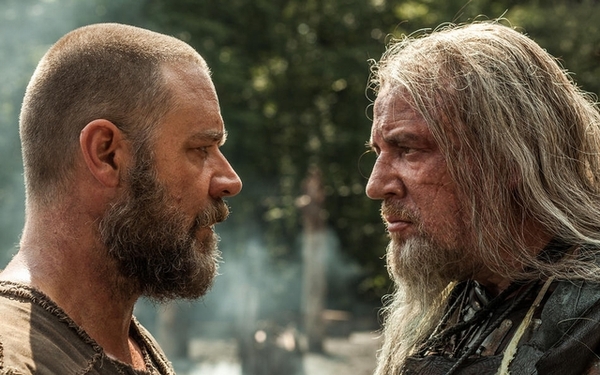Noah Review
The story of God telling Noah to build an ark, all the animals coming aboard in twos, and then there being a great flood, has largely been deemed children’s stuff. Given the last on-screen version of this story was the Steve Carell family film “Evan Almighty,” this stigma of biblical films has held true. That brings us to “Requiem for a Dream” and “Black Swan” filmmaker Darren Aronofsky’s version.
“Noah” has long been a passion project for Aronofsky, who clearly saw something profoundly cinematic in this story and wanted desperately to challenge the cookie-cutter version told in Sunday schools all over the world. Indeed, Aronofsky has crafted a mature telling, one that creates a rich mythology around the biblical verses and stages a mighty battle for the redemption of humanity, with the essence of man’s true nature at stake.
The story imagines Noah (Russell Crowe) and the flood as the critical final chapter of a narrative arc that started with creation and included the expulsion from Eden, with humanity descending from two men: Cain, the one who killed his brother, and Seth. Noah and his family descend from Seth and are protectors of creation, but they are the last of his lineage, so “The Creator” sends Noah visions of a flood – and you know the rest. What you might not know, however, at least according to Aronofsky and co-writer Ari Handel, is that angels who were sympathetic toward man and defied The Creator were banished to Earth to live as rock monsters.
The science-fiction/fantasy approach of “Noah” is reminiscent of Aronofsky’s polarizing film “The Fountain.” He crafts this world with the best of artistic intentions, but just in playing around with sensitive material, he walks the fine line between creativity and irreverence. “Noah” is best enjoyed when thought of as a creative, fantastical interpretation of what happened between the lines of the Old Testament.
The main plot points of this story are quite well known, so creative interpretation is everything. “Noah” doesn’t lack for creativity, but the various “interpretive” plot points drag things out on occasion, and in some cases get weird. The film’s final act, after Noah and family board the ark – yes, after – evolves into a horror thriller of sorts and warps our perspective of the protagonist quite a bit. Aronofsky has expert intentions here that can be admired amid the strangeness of this shift in tone, but it may sour some folks.
Even more radical are Noah’s vision sequences and a scene that depicts the days of creation. You can see Aronofsky’s “Requiem for a Dream” roots here, his penchant for grotesque imagery that is bound to stay with you well after the movie. Although this merely adds artistic value to “Noah,” which would otherwise just be a biblical blockbuster, it is memorable.
Although talented, the rest of the cast largely serves the purpose of expounding on Aronofsky’s interpretation. Much of what happens to them serves as a side-plot exploration of the deeper ideas of mankind’s nature. Ray Winstone as Tubal-Cain epitomizes our evil inclinations, for example, while Noah’s son Ham (Logan Lerman) is the “Luke Skywalker” of the story, with everything hinging on which way he will lean.
“Noah” is a film of astounding visuals designed around philosophical ideas. As such, it’s entertaining to watch and ripe for discussion, but the story operates almost exclusively to make these thematic points rather than to provide the most enjoyable narrative possible. At the same time, working within the confines of a story thousands of years old, Aronofsky and co. undoubtedly bring something new to Noah and the ark that brings its message into a mature, modern context.
3.5/5 Stars
Noah
Directed by Darren Aronofsky
Written by Darren Aronofsky and Ari Handel
Starring: Russell Crowe, Jennifer Connelly, Logan Lerman, Emma Watson, Ray Winstone







0 Comments
You can be the first one to leave a comment.